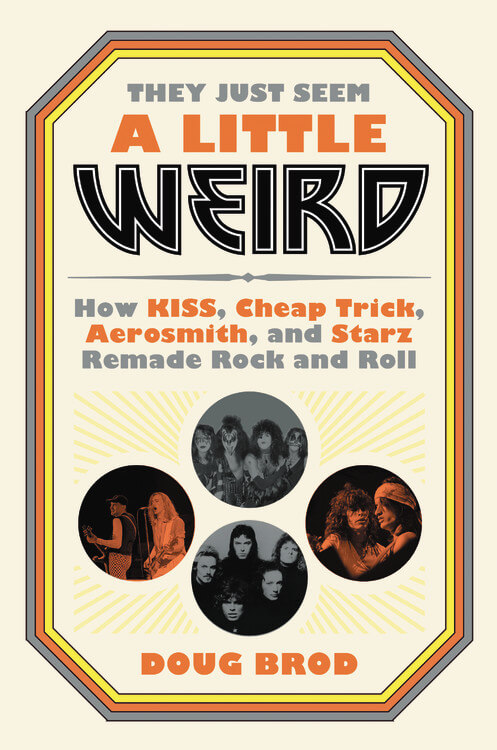Doug Brod’s They Just Seem a Little Weird examines KISS, Aerosmith, Cheap Trick, Starz and the making of ‘70s rock megastardom.
Eric and I didn’t have much to go on, but we didn’t need much, either. We were desperate tweens ready to rock. It didn’t matter that we didn’t know the band that was playing. They had the look and we had to go. Rock was still a fresh discovery for us and a real concert, an actual concert, was something we wanted. Bad.
It was Eric who had spotted the ad in the local daily newspaper—The State Journal-Register in Springfield, IL—and showed it to me. We were transfixed. The five members of the band were dressed in white and looked almost androgynous, angelic by design. Eric told me they were supposed to be, like, the opposite of KISS. I wasn’t sure what that meant but anything that referenced KISS, even as an antithesis, had to be cool. Then he showed me how if you turned their logo in the ad upside down, it still spelled their name: “Angel” flipped was still “Angel.” We took the ad to my mother, she picked up the phone and, with Eric’s mother on the line, asked us if we even liked that band. Somehow we let it slip that we’d never heard them. The moms made their ruling. Our case was lost.
Hearing Angel before going to the show—or at least begging to go—was not an option. Hearing a band usually meant buying a record, and records cost money. We might occasionally get lucky and catch a group on Don Kirshner’s Rock Concert or The Midnight Special or hear a song on KSHE-95 out of St. Louis if the wind was blowing the right direction. But record shopping was reserved for known known quantities. Most of the time we were operating with limited information.
Eventually we caught Angel on TV and were unenthused. They weren’t as hard as we’d somehow imagined they’d be. We agreed that they still looked cool, though, and that was something. Image mattered. Long before YouTube, before rock had even become a staple of broadcast television, the image a band projected through clothes, hair and album art was a big part of what pushed demand. Ever since Elvis, rock has been—in one way or another—about looking cool.
Branding and image-crafting is at the core of Doug Brod’s They Just Seem a Little Weird: How KISS, Cheap Trick, Aerosmith, and Starz Remade Rock and Roll (Hachette Books). As a former editor-in-chief of both Spin and TV Guide, Brod gets (to borrow Joni Mitchell’s phrase) the star maker machinery behind the popular song. He avoids getting bogged down in sex and drugs, focusing instead on the rock ’n’ roll, tracing the shared gigs and overlapping management of the four bands. He lets the silliness of the acts, and the era, shine through without falling to mockery. He appreciates the good in each of them without overinflating their greatness. It’s an even-handed and fantastically readable book, with sources culled from his own interview archive and new interviews with the band members, as well as members of bands who followed the hard rock road they paved.
KISS, Cheap Trick and Aerosmith are as good a triumvirate for mid ‘70s rock excess as any; one could argue for others, but that would just be replacing, not improving. KISS were the undisputed kings of the mountain, at least as far as me and my best friend were concerned. Aerosmith was my #2. (Eric was skeptical, finding them a bit too skeevy.) Others were in there— Queen, Steppenwolf—but condemned to second tier status. And Cheap Trick, good Illinois boys that they were, would be among my first handful of concerts. The three bands projected character and made songs that leapt from the turntable.
Starz was a different matter. We’d look at their records at the mall, trying to decide if they were cool or not based on look and logo. They never made the cut—$6 was a lot of money and the clothes and covers didn’t cut it. They remained relegated to the records we’d look at again and again (like Bootsy Collins, is he, like, Black KISS? is such a thing possible?) and return to the bin.
Brod gives Starz equal treatment in his book without pretending they enjoyed the same success as his other subjects. He calls their second album—Violation, an attempted concept album about a future where rock is illegal which namechecks Aerosmith—“one of the great unheard albums of the era,” and relates a true star tale involving guitarist Richie Ranno throttling manager Bill Aucoin for approving a radio edit of a song without the band’s OK. While the band has remained active (with stops and starts and changes in lineup), the incident marked the beginning of their descent, having fallen short of stardom.
Jonathan Daniel, a fan who would go on to play with Fall Out Boy, Panic! At the Disco and Green Day, laments the band’s also-ran status. “That was the thing about Starz,” he tells Brod. “Everything else might have been slightly wrong—the logo is genius but a little corny, the name is a little corny with the z—but the songs were so good. I could not for the life of me understand why they weren’t hits.”
Daniel’s loyalty is laudable. A nice, complimentary end to my part of the story would be a newfound Starz fandom, but that wasn’t under the final flap of the cootie-catcher. I dialed up their debut album while reading and found myself confronted with some good old, rote rock ’n’ roll, perfunctory pounders. They didn’t explode like KISS, Aerosmith and Cheap Trick, each in their own way, did. They weren’t larger than life like hard rock in the ‘70s was supposed to be. They didn’t scream success. Maybe they should have gotten a cooler logo.










